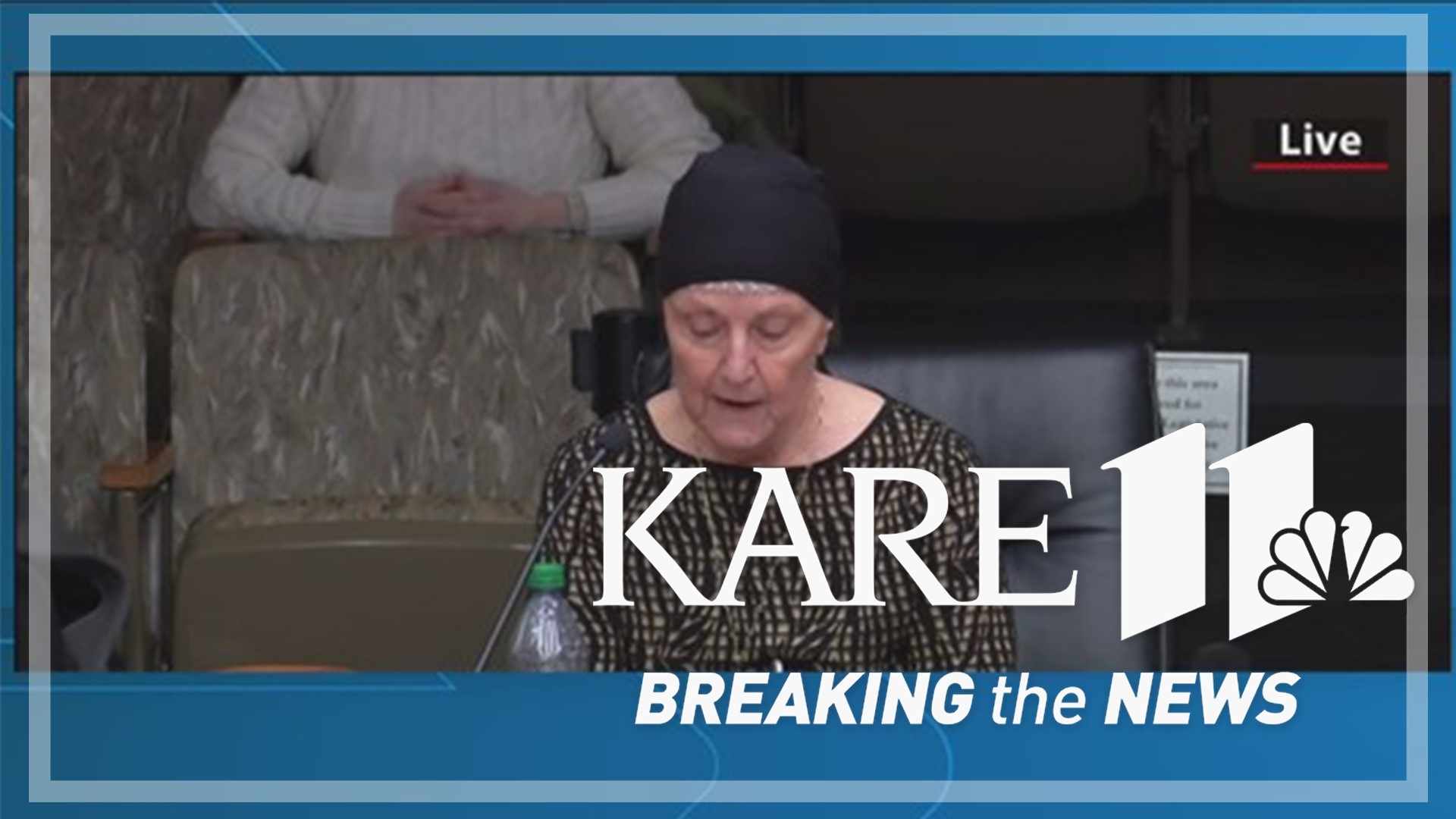ST PAUL, Minn. — A bipartisan meeting of minds at the Minnesota State Capitol Thursday had lawmakers debating whether Minnesotans should be afforded the right to die.
The proposed legislation, which would give terminally ill adults the choice to use physician-assisted, end-of-life options, was debated in a nearly five-hour-long hearing. At its conclusion, the House Health committee made the rare move to push the bill forward, despite the legislature being between sessions.
The debate around the End-of-Life Option bill (HF 1930), introduced by State Rep. Mike Freiberg (DFL-Golden Valley), is not new to the floor of the legislature. The highly contentious topic of medically assisted suicides first started making waves in the United States back in 1998, when Oregon passed a similar law allowing terminally ill patients with fewer than six months to live to choose how and when they want to die. Freiberg said his bill, introduced in Minnesota in 2015, is modeled after Oregon's.
If Freiberg's bill does eventually become law, it would allow a medical professional to aid in a patient's death by prescribing a lethal medication. To qualify, a person must be over 18 years old; be diagnosed with a terminal illness with the prognosis of six months or less to live; eligible for hospice; have the mental capacity to make health care decisions and provide informed consent; and they must have the ability to self-administer medications.
Additionally, two health care providers must be present, at least one of whom must be a nurse practitioner or physician who evaluates the patient and agrees they've met those qualifications.
"This is a bill that emphasizes personal autonomy at the end of a difficult life," Freiberg said in Thursday's hearing. "I've heard very difficult stories from so many Minnesotans, and some have dealt with loved ones dealing with unimaginable suffering. Some have terminal diseases themselves and want an option to end their suffering when it becomes unbearable. This bill will give them this option."
Freiberg went on to claim data shows the majority of Minnesotans — and Americans overall — support of an end-of-life option.
Some of those supporters testified during Thursday's hearing, including Nany Uden, of Corcoran, Minnesota, who said her life was forever changed after a seizure caused her to crash her vehicle in November of 2022. After waking up in the hospital, Uden said doctors told her they found a brain mass. The discovery led her to Rochester's Mayo Clinic, where she was ultimately diagnosed with glioblastoma, an aggressive form of terminal brain cancer.
"I promised my family that I would fight this ugly disease until there's no hope left and my death is inevitable. So if there are no more treatment options, then I deserve more death options," Uden said, adding, "I'm not afraid of death, but I am afraid of how I will die."
Uden said the legislation would allow patients like her to end their lives on their own terms, instead of having to endure a "slow, painful death."
"While I've always supported the idea of dying on one's own terms, it is now very real and urgent to me personally," she said. "I don't have time for a long debate. This bill has been in front of the Minnesota Legislature for 10 years already. It's time to act."
The committee also listened to testimony from Dr. Cory Carroll, a practicing physician in Fort Collins, Colorado, who also works as the part-time medical director for the nonprofit Compassion and Choices. The organization works to educate, support and mentor physicians around the country who are incorporating medical aid in dying in their practices. Colorado adopted its end-of-life options legislation in December of 2016.
Carroll said data shows patients who have requested medical aid in dying have typically endured years of treatment for chronic conditions and had already been placed in hospice care.
"They do not want to die," he said, "but have accepted their death is inevitable and want to avoid unnecessary suffering."
Opponents of the legislation argue the idea, which has now been enacted in 10 states and Washington, D.C., is a "slippery slope."
"Every life has value and we've seen a disturbing and slippery slope for programs like these in other states and countries," said House Minority Leader Lisa Demuth (R-Cold Spring) in a statement following the hearing.
In a separate statement, Senate Republican Health and Human Services Committee Lead Paul Utke (Park Rapids) added he believes the bill is "extremely dangerous."
"A person’s right to life does not depend on their quality of life, mental health, or income," he said. "This bill is an extremely dangerous policy that will pit Minnesotans against one another and divide families facing challenging situations.”
Legislators debating the bill will take their next steps after the start of the 2024 Legislative Session, which begins on Feb. 12., in a hearing with the House Public Safety Committee.
The Senate's version of the bill will be heard after session begins. That hearing has not yet been scheduled.
WATCH MORE ON KARE 11+
Download the free KARE 11+ app for Roku, Fire TV, Apple TV and other smart TV platforms to watch more from KARE 11 anytime! The KARE 11+ app includes live streams of all of KARE 11's newscasts. You'll also find on-demand replays of newscasts; the latest from KARE 11 Investigates, Breaking the News and the Land of 10,000 Stories; exclusive programs like Verify and HeartThreads; and Minnesota sports talk from our partners at Locked On Minnesota.
- Add KARE 11+ on Roku here or by searching for KARE 11 in the Roku Channel Store.
- Add KARE 11+ on Fire TV here or by searching for KARE 11 in the Amazon App Store.
- Learn more about the KARE 11+ app for Apple TV in the Apple App Store.
- Learn more about KARE 11+ here.
Watch more Breaking The News:
Watch all of the latest stories from Breaking The News in our YouTube playlist:

